
 [rating=3]“The First Deep Breath” is a modern-day story of the Jones family, fractured by the weight of family secrets. Written by Lee Edward Colston II and directed by Steve H. Broadnax III, this is a tale about a black middle-class family from Philadelphia trapped by their past and caught in a tangled web of expectations. As they hold onto others’ needs and wants in codependent relationships, they fail to express their individuality and their authentic selves. Each person thus becomes broken in their own way. Once they become honest with themselves and each other and share deeper truths, they can finally break free—and take that metaphoric “first deep breath”, allowing them to move forward with their personal and professional lives.
[rating=3]“The First Deep Breath” is a modern-day story of the Jones family, fractured by the weight of family secrets. Written by Lee Edward Colston II and directed by Steve H. Broadnax III, this is a tale about a black middle-class family from Philadelphia trapped by their past and caught in a tangled web of expectations. As they hold onto others’ needs and wants in codependent relationships, they fail to express their individuality and their authentic selves. Each person thus becomes broken in their own way. Once they become honest with themselves and each other and share deeper truths, they can finally break free—and take that metaphoric “first deep breath”, allowing them to move forward with their personal and professional lives.
We become intimately familiar with the Joneses and their family dynamics during the course of the 3-1/2-hour marathon. “I feel like I’m binge-watching,” said one audience member to another during the second intermission. Indeed, the three-act play seems more like watching three TV episodes back to back, because some surprising admission or admonition belies the end of each act.
At the very beginning, Pastor Albert Jones (David Alan Anderson), the preacher at a small black church, delivers his fiery sermon to his congregants, namely, our audience. A domineering, judgmental, and “old-school” man, he explains that his ministry is growing and that the community requires a new megachurch to be built. Using his family as an example, he prays for the whole congregation by means of revealing a little something about his personal life: His wife Ruth (Celeste Williams) is suffering from Alzheimer’s disease; his oldest son, his namesake Al Junior a/k/a Abdul Malik (Clinton Lowe), has been in prison; and their daughter Diane has died some years prior in a horrific traffic accident. When the scene shifts from the church to their nice middle-class house, the audience learns the details. Al has just been released from prison after six years, having been convicted of rape. Diane would routinely get drunk and that’s why she was in the fatal accident in the first place. We see her photos and her urn as a part of a shrine in the Jones’s dining room.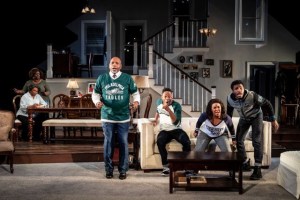
It is heartbreaking to watch Ruth hallucinate, forget things, and not know where she is and who other people are. Sometimes she confuses the deceased Diane with her twin sister Dee-Dee (Melanie Loren), who is very much alive; sometimes Dee-Dee will pretend to be Diane to quell her mother’s agitation. Loren’s fine singing is complimented by Patrick Agada’s fantastical ballet performance in the role of A.J. Scared of his father’s wrath, he pretends to be a basketball player who is also committed to becoming a preacher like his dad. Equally scared, Al has preferred prison time to standing up to his father and admitting to his homosexual relationship. Aunt Pearlie (Deanna Reed-Foster), like the rest, does what she’s expected to do by getting up at 3:30 a.m. to start making a gigantic Thanksgiving Dinner with more dishes than one can count. She, like her sister Ruth and her niece and nephews, loves and fears Pastor Jones at the same time. Leslie Carter (Gregory Fenner), who plays Dee-Dee’s boyfriend, and Tyree Fisher (Jalen Gilbert), who has watched over Al’s siblings during his six-year absence, are both from outside the family; they say what they mean and mean what they say. Yet what Ruth says in her more lucid moments is the most genuine: She tells the truth unvarnished. A keen observer of her husband and children, she sheds a candid light on the family’s bugaboos. It makes for a sad chuckle. We see ourselves in her blatant honesty.
Playwright Colston is superbly eloquent in his uses of the English language. Especially moving is Al’s love poem to his partner, one of the most stirring contemporary odes you might hear on stage. Brilliant too are words of wisdom, with memorable lines like this one: “Don’t pass words out like grenades; one will explode on you.”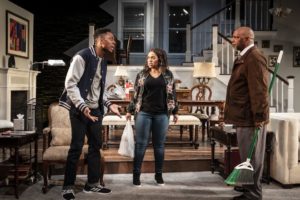
This sort of attention to detail is admirable. We enjoy watching so many rich elements: for example, the fighting around the Thanksgiving dinner table is well done and the tryst that the pastor has with Aunt Pearlie gives the show a nice touch (in more ways than one). But we are mired in much too much detail when we relive someone else’s life and listen to the judgments that they make. It is important for us as an audience to draw our own conclusions without every single item being laid out on the table to examine.
Highly problematic is when a serious drama turns comedic when it shouldn’t be. The story is overplayed in the third act, especially when people start throwing punches at each other. If this is intended to be the climax, it does not work. The director’s job is to make us appalled by the fighting while being simultaneously empathetic towards the characters. It’s the behavior we don’t like; not the people themselves. That’s one of the lessons we must take away from Colston’s script that needs to be better communicated, not laughed at.
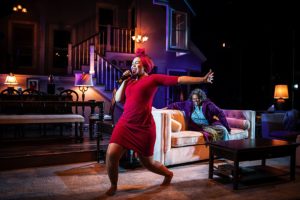 More importantly, the show needs to be trimmed and brought back to its fundamentals. One way of doing so is to focus earlier on Pastor Jones’s hypocrisy rather than delaying this revelation into the third act. This thread is continually used as a teaser but instead should structure the entire performance. By holding back, its eventual disclosure seems too much like a loose thread that is piled atop of all the other family dysfunction which the audience already knows about. Ho-hum, we think. Rather, this part of the story is an essential element—not a slap-dash add-on—that should have been woven more tightly into the warp.
More importantly, the show needs to be trimmed and brought back to its fundamentals. One way of doing so is to focus earlier on Pastor Jones’s hypocrisy rather than delaying this revelation into the third act. This thread is continually used as a teaser but instead should structure the entire performance. By holding back, its eventual disclosure seems too much like a loose thread that is piled atop of all the other family dysfunction which the audience already knows about. Ho-hum, we think. Rather, this part of the story is an essential element—not a slap-dash add-on—that should have been woven more tightly into the warp.
Scenic designer Regina Garcia and props designer Jenny Pinson have done a smashing job with inventing a set that depicts nicely decorated rooms in the Jones family house, complete with an imaginary television set. Costume designer Christine Pascual has provided beautifully authentic outfits, well suited to each of the characters. Josh Schmidt’s sound design and original music are exceptional in setting the mood. Inspired lighting by Jason Lynch is beautiful throughout and especially breathtaking during the dance number, splendidly choreographed by Breon Arzell.
Colston gives us an opening into a world of psychological conflict within the context of an urban black family. The overarching theme is the process of self-discovery and the need for each of us to be free to pursue our innermost wants and desires. In this play, the bound spirits attain some measure of freedom, but that does not mean that their lives have become any better. Of course, “better” is a relative term. A.J.’s reflection on this at the very end is like the closing parenthesis to his father’s sermon at the beginning. None of us knows what’s in store for us or for the characters on stage, or whether any of us will be able to fulfill our dreams or not. We just know that people move on, and life happens.
The world premiere of “The First Deep Breath” is playing at the Victory Gardens Theater, 2433 N. Lincoln Avenue, Chicago, through December 22, 2019.
Tickets are $31-$65.
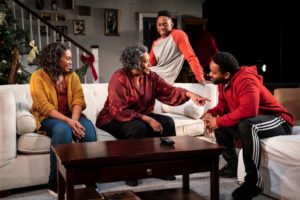 The performance schedule is as follows:
The performance schedule is as follows:
Tuesday through Friday — 7:00 p.m.
Saturday – 2:00 p.m. and 7:30 p.m.
Sunday – 2:00 p.m.
Word for Word (open captioning) performance: Wednesday, December 4 at 2:00 p.m.
Audio Description/Touch Tour performance: Sunday, December 8 at 2:00 p.m. (Touch tour at 12:30 p.m.)
For tickets and information, call the Victory Gardens Box Office: 773-871-3000, email tickets@victorygardens.org, or visit www.victorygardens.org. Ask the box office about discounts for students, seniors, and those with access needs. For groups of 10 or more, call 773-634-9862.
Valet parking is available at the Biograph/Victory Gardens for $13 one hour before curtain. There is also a self-parking garage at 2316 N. Lincoln Avenue; rates start at $6/hour. Call the box office if you need additional assistance 773-871-3000.
To see what others are saying, visit www.theatreinchicago.com, go to Review Round-Up and click at ” The First Deep Breath”.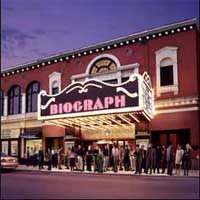


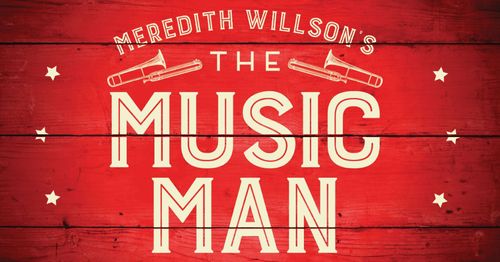


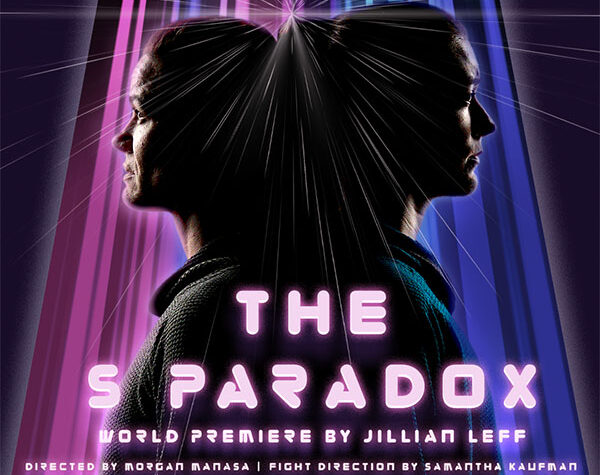
More Stories
“The Music Man”
“The S Paradox” reviewed by Julia W. Rath
“A Year With Frog and Toad”